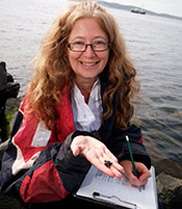Focus on adaptation when times are tight

Biologists have been advised not to over-commit time and effort establishing broader climate change links to local ecological impacts.
In a commentary article in the journal Nature Climate Change, US, Spanish and Australian researchers submit that biologists should, instead, aim to achieve a balance between understanding climate change impacts and planning for the consequences.
“There is little point in focussing on fully identifying the climate impacts while losing species,” says co-author Dr Elvira Poloczanska, an environment scientist with CSIRO’s Climate Adaptation Flagship.
According to Dr. Poloczanska, and co-author Dr. Anthony Richardson from CSIRO and the University of Queensland, climate scientists have, for two decades or more, linked global warming impacts to the rise in greenhouse gas emissions from human activity.
“Biologists have already shown globally that the flowering and breeding times and distributions of plants and animals are changing,” Dr. Poloczanska said. “This is consistent with universal atmospheric warming and elevated greenhouse gas emissions likely arising from human activity.
“But, if you scale this down to the local level with individual species the application is questionable. This does not mean change isn’t happening but climate models do not work on such fine scales and biological responses are often too complex to be modelled effectively, especially where they need to account for extreme events and underlying climate variability.”
Rather than submitting to inexhaustible demands for more proof, it would be more advisable to focus on developing crucial adaptation and conservation measures.
Dr. Richardson said that to improve estimates of future biological impacts researchers need to focus on how other human stressors such as habitat destruction, fishing and pollution increase the impacts of climate change.
“Fortunately from a conservation standpoint, these other stressors are more easily managed on local scales than climate itself, and are crucial factors in constructing adaptation programs to cope with human-induced climate change,” Dr. Richardson said.
Climate impacts and adaptation feature on the program of Australia’s biennial climate change conference, GREENHOUSE 2011, being held in Cairns from 4-8 April.
Dr. Poloczanska said there are several Australian regional examples that show interactions between climate variables such as temperature and other human stressors.
“We know from work off Tasmania that, as the seas have warmed, the long-spined sea urchin Centrostephanus rodgersii has moved from mainland Australia down to temperate Tasmania.
“This urchin is eating the kelp forests and turning them into ‘urchin barrens’ devoid of much marine life with consequences for rock lobster and abalone fisheries. However, if the urchin’s major predators are present, such as large rock lobsters, then the urchin numbers could be potentially kept in check,” Dr. Poloczanska said.
“Large-scale harvesting of rock lobster in the region could have played a role in the urchin population explosion. Putting research effort into understanding the complex interactions between kelp, urchins and lobster is important to identify potential adaptation responses for kelp forests under a warming climate. Building populations of large lobsters to control urchins could create a win-win situation for both fisheries and kelp forests.
“This is a clear example of where we can achieve better conservation outcomes by focusing on deeper understanding of processes and climate interactions, rather than spending considerable research effort trying to estimate the proportion of kelp decline that is due to human CO2 emissions,” Dr. Poloczanska said.
Provided by CSIRO
















